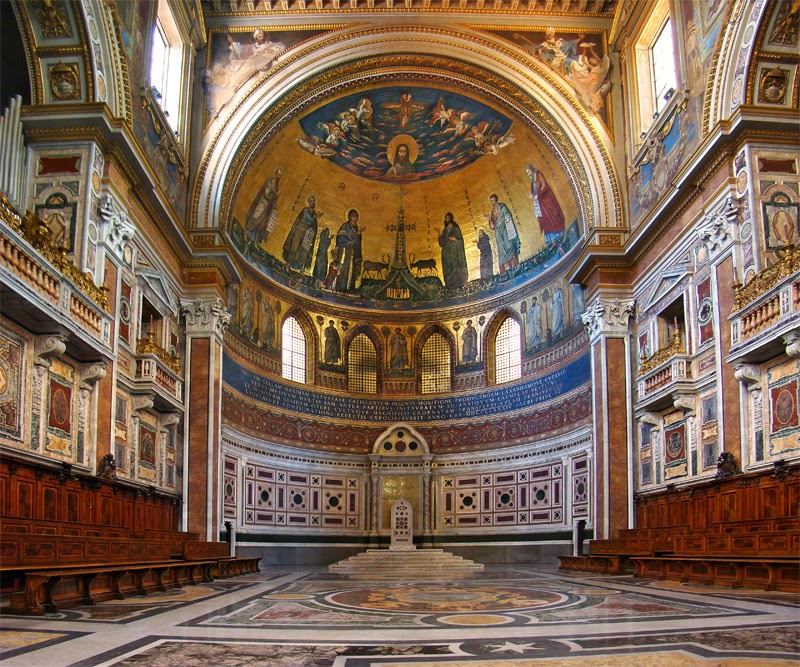FEAST OF THE DEDICATION OF THE LATERAN BASILICA - 1 Corinthians 3:9-11,16-17
The importance of the Temple
In the Old Testament, the Temple was highly revered, being the centre of all religious life, as it was seen as God’s dwelling among his people. The Psalms express very well the centrality of the Temple in the spiritual life of the people.
“One thing I asked of the Lord,
that will I seek after:
to live in the house of the Lord
all the days of my life,
to behold the beauty of the Lord,
and to inquire in his temple.” (Ps 27:4)
O Lord, I love the house in which you dwell,
and the place where your glory abides. (Ps 26:8)
To worship in spirit and truth
The early Christians had no temple and no churches. They celebrated the Eucharist in private houses (Act 2:v46) or in private spaces provided by people with bigger houses. Jesus had taught them that they should worship God “in spirit and truth” (Jn 4:24), and for such worship, temples and churches were of no importance. This was plainly confirmed with the destruction of the Temple of Jerusalem, which brought about the disappearance of the sacrifices and the priesthood of the Old Testament. The Christians had learnt with Jesus that wherever two or three are gathered in his name, he is there with them, making their coming together an act of worship to the Father.
Paul had stressed that we are “God’s building”, that is “God’s temple” (1 Co 3:9,16). And he emphasises the same idea again: “Or do you not know that your body is a temple of the Holy Spirit within you, which you have from God, and that you are not your own.” (1 Co 6:19).
Peter expresses a similar idea, when he writes: “like living stones, let yourselves be built into a spiritual house, to be a holy priesthood, to offer spiritual sacrifices acceptable to God through Jesus Christ.” (1 Pet 2:5).
The Lateran Basilica as the cathedral of Rome
However, as the communities grew, the need for public and larger meeting places was felt. And this became more and more so, when Christians were allowed to have a free expression of their faith. After Constantine granted the Christians freedom of worship, great numbers of people flocked to the Church and the need for meeting places became urgent.
It was then that the Emperor Constantine gave the Lateran palace to the Pope. It was called basilica, meaning “royal palace”, and within it there was a big hall for big functions and big public audiences. The palace became the pope’s residence and the hall was transformed to become the cathedral of Rome, that is the church of the Bishop of Rome, the Pope. It was called the Basilica of the Saviour, having been dedicated to Christ the Saviour. Later on, it was also dedicated to St. John the Baptist and St. John the Evangelist.
This basilica is commonly known as the Lateran Basilica. The name came from the Laterani family, a family of common people who reached high positions. In Nero’s time, one was accused of conspiracy against the emperor and the property was confiscated. The palace built on the Laterani’s land became into Constantine’s possession through his wife.
Being the cathedral of the Pope as Bishop of Rome and being as well the oldest in Rome, the Lateran Basilica is considered the mother and head of all churches. It was sacked by the Vandals and nearly destroyed by an earthquake and twice burnt by fire, but it was always restored.
An assembly gathered in the name of Jesus Christ
Celebrating the feast of the dedication of the Lateran Basilica, we are celebrating the community who gathers in the name of Jesus Christ, receiving from him the living water that sustains us and takes us into the eternal life. This day reminds us that we are an Assembly (Ecclesia) of a multitude of peoples and nations united in Jesus Christ and with him worshiping the Father in spirit and in truth. And this is true of all our churches or assemblies, who have Christ as the Head and the High Priest that presides the celebration of God’s glory, singing the praises of his deeds of salvation. We are one body with Jesus Christ, and with him we offer ourselves in sacrifice of thanksgiving to the Father.

No comments:
Post a Comment